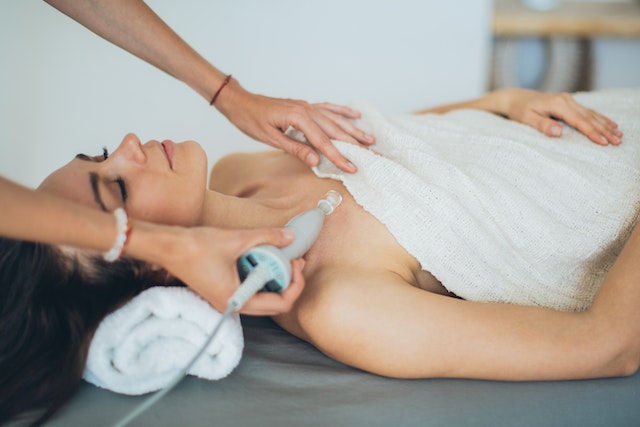CO2 laser resurfacing helps treat many medical skins and numerous cosmetic issues. For example, sun damage due to scars and skin cancer, and visible signs of ageing.
Treatment of Sun-Damaged Skin
Exposure to UV light contributes to many visible signs of skin ageing. CO2 laser resurfacing helps significantly reduce the appearance of the problems below. For example,
- Uneven or rough skin texture
- Sun spots and liver spots
- Spider veins
- Sagging due to reduced elasticity
Fine lines and wrinkles
CO2 laser resurfacing can lessen the appearance of wrinkles and fine lines. This helps improves many issues. For example,
- wrinkles and lines on the forehead
- crow’s feet, wrinkles or lines that come under and around the eyes
- laugh lines, that may appear around the mouth
Laser resurfacing may not only reduce the appearance of wrinkles. However, it also uplifts collagen production, which may improve your skin’s health over time.
Acne scars
Laser treatments with CO2 will help in the reduction of acne scars. This is due to the stimulated collagen production that helps smoothen and tighten the scars. However, the treatment may not be effective on all types of acne scars.
In some cases, other procedures like subcision, micro-needling, and trichloroacetic acid (TCA) peels may be more effective for ice-pick type acne scars.
Warts
CO2 lasers may be used on warts that don’t respond to other treatments. However, dermatologists mostly recommend other treatments for them. For example over-the-counter remedies or freezing.
Sebaceous hyperplasia
Sebaceous hyperplasia may occur when sebum gets trapped in an oil gland. This enlarges the gland and causes small, waxy bumps on the skin. These mostly come up on the face. These are often harmless, but people opt to remove them for improved skin texture and appearance.
CO2 lasers are effective to remove these bumps and also prevent them from growing back. Although some researchers suggest that an erbium laser can be a better option.
Skin cancer
A dermatologist may use CO2 lasers on pre-cancerous actinic keratoses tumors or, in some cases, to help treat certain types of early-stage skin cancers.
CO2 lasers help prevent or treat skin cancers by shrinking and then destroying the cancerous tissue. They perform this with less bleeding or damage to the surrounding tissue.






